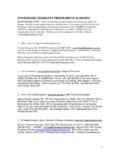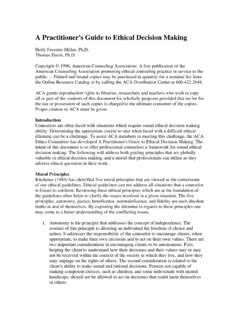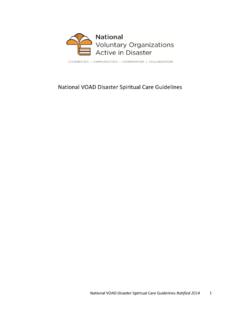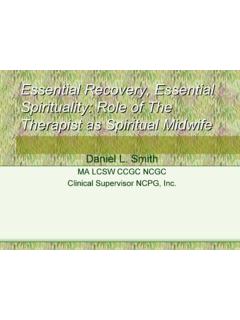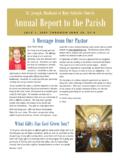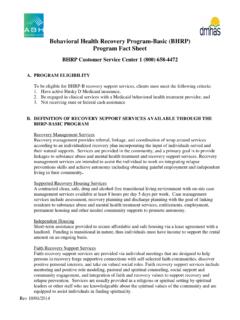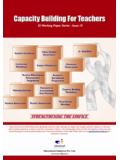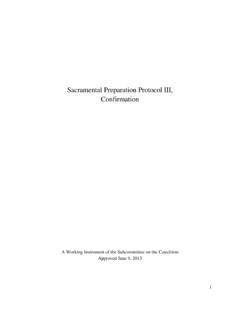Transcription of Highlights of the ACA Code of Ethics - Alabama Counseling
1 Highlights of the ACA code of Ethics Emphasis on multiculturalism, diversity issues among major changes By Michael M. Kocet Earlier this year, the American Counseling Association Governing Council approved the adoption of the 2005 ACA code of Ethics . The code is revised approximately every 10 years and provides an opportunity for the Counseling profession to examine current practices and issues faced by professionals in a variety of settings. A central focus of our professional code of Ethics is to help guide professional practice with clients, students, supervisees, colleagues and research participants. A code of Ethics is designed to protect the well-being of those served by counselors, as well as to advance the work of the profession. The purpose of this article is to highlight some of the main changes in the 2005 ACA code of Ethics . Readers are encouraged to log onto the ACA website at to access the revised code . The new code is also being published in this issue of Counseling Today beginning on page 25.
2 The 2005 ACA code of Ethics consists of eight main sections broken down into the following areas: The Counseling Relationship; Confidentiality, Privileged Communication and Privacy; Professional Responsibility; Relationships With Other Professionals; Evaluation, Assessment and Interpretation; Supervision, Training and Teaching; Research and Publication; and Resolving Ethical Issues. A new glossary is also provided to help readers understand key Counseling terms and how they are defined in the document. Another feature is a section that outlines the five main purposes of the ACA code of Ethics : The code enables the association to clarify to current and future members, and to those served by members, the nature of the ethical responsibilities held in common by its members. The code helps support the mission of the association. The code establishes principles that define ethical behavior and best practices of association members.
3 The code serves as an ethical guide designed to assist members in constructing a professional course of action that best serves those utilizing Counseling services and best promotes the values of the Counseling profession. The code serves as the basis for the processing of ethical complaints and inquiries against members of the association. Multiculturalism and diversity issues An important component threaded through the 2005 ACA code of Ethics is the emphasis on multicultural and diversity issues facing Counseling professionals. A new subsection, " Support Network Involvement," is just one example. It states that "Counselors recognize that support networks hold various meanings in the lives of clients and consider enlisting the support, understanding and involvement of others ( , religious/spiritual/community leaders, family members, friends) as positive resources, when appropriate, with client consent." This section represents a variance from the 1995 code of Ethics , which only addressed the role of family involvement.
4 The 2005 code broadens this section to include any person from the perspective of the client who plays a central role in that client's life. Another culturally relevant example contained in the 2005 code is " Receiving Gifts," which states: "Counselors understand the challenges of accepting gifts from clients and recognize that in some cultures, small gifts are a token of respect and showing gratitude. When determining whether or not to accept a gift from clients, counselors take into account the therapeutic relationship, the monetary value of the gift, a client's motivation for giving the gift and the counselor's motivation for wanting or declining the gift." A final example of cultural issues affecting the Counseling relationship is in the section on diagnosis of mental disorders. " Cultural Sensitivity" states that "Counselors recognize that culture affects the manner in which clients' problems are defined. Clients' socioeconomic and cultural experiences are considered when diagnosing mental disorders.
5 " Dual/multiple relationships A paradigm shift is currently taking place within the Counseling profession and within other mental health organizations when it comes to traditional views on dual or multiple relationships. Recently, Ethics scholars have called attention to the fact that not all dual or multiple relationships should be avoided or viewed as harmful. In fact, some argue that dual/multiple relationships within a Counseling context can actually be growth enhancing. To speak to this change, the revised code of Ethics contains " Potentially Beneficial Interactions." It states in part, "When a counselor-client nonprofessional interaction with a client or former client may be potentially beneficial to the client or former client, the counselor must document in case records (when feasible) the rationale for such an interaction, the potential benefit and anticipated consequences for the client or former client and other individuals significantly involved with the client or former client.
6 " Counselors should consult the 2005 ACA code of Ethics for a detailed explanation of this section of the document. End-of-life care A new addition to the 2005 Ethics code is Section , which discusses end-of-life care for terminally ill clients. ACA is one of the few national mental health-related organizations to specifically address end-of-life care in its Ethics code . While this section does not endorse or prescribe one single way of approaching this sensitive issue, it does stress the importance of the counselor being competent to work with clients facing end-of-life issues. Counselors handling end-of-life issues with clients should seek supervision and consultation to help clients receive competent care from a wide range of professionals. Counselors should also work toward supporting the client's ability to make informed judgments on end-of-life decisions that foster the client's ability for self-determination. Use of technology Section , "Technology-Assisted Services," integrates ACA's 1999 Ethical Standards for Internet Online Counseling and broadens ethical use of technology in research, record-keeping and provision of services to consumers.
7 Counselor impairment and transfer of clients More detailed language was added to the section on counselor impairment (Section ), and a new section was added that addresses the importance for all Counseling professionals, regardless of setting, to create a plan for the transfer of clients and records to an appropriate colleague in the event of a counselor's incapacitation, death or termination of practice (Section ). Supervision, training and teaching A number of changes were also made to Section F, which deals with supervision, training and teaching. Counselor educators, those who supervise Counseling trainees and Counseling students are encouraged to pay particularly close attention to this section devoted to the training and competence of new Counseling professionals. Section F deals with such areas as supervisory relationships, potentially beneficial relationships between supervisors and supervisees, endorsement, counselor educators, student welfare and orientation, self-growth experiences, impairment of Counseling students and ethical evaluation of students' performances within their academic preparation.
8 Miscellaneous changes Other noteworthy items found in the 2005 ACA code of Ethics are related to changes in terminology that have evolved since the last revision of the code . These changes include (but are not limited to) a shift from the 1995 code 's use of the word "tests" in Section E to the use of the term "assessment" in 2005. It was determined that "assessment" has a broader, more holistic meaning. In addition, use of the term "research participants" is intended to be more inclusive and less clinically detached than the previous term in use, "research subject." Section E also helps counselors address the appropriate handling of records during the research process and the confidentiality of people involved in research projects. The final section of the code of Ethics , Section H, helps practitioners address ethical dilemmas and outlines the appropriate ethical behavior counselors are expected to uphold. While this article provides a brief and general overview of a few revisions to the ACA code of Ethics , it is important to take the time to carefully review the entire document and understand both the specific and the broad changes that have evolved between the 1995 and 2005 documents.
9 In the coming months, books and scholarly articles addressing specific sections of the 2005 ACA code of Ethics will be available. It's important at all stages of professional development to have an Ethics library at your disposal should the need arise to consult with the Ethics literature. ACA members are strongly encouraged to consult with Ethics experts in the field on the impact that the 2005 ACA code of Ethics will have on counselors' daily work. The 2006 ACA/Canadian Counselling Association Convention in Montreal will have a presidential program addressing the new code , and all are encouraged to attend the various training and continuing education opportunities that will be available. It is critical to examine the professional code of Ethics from a cultural and contextual perspective rather than seeing it simply as a list of dos and don'ts. No code of Ethics can prescribe what actions counselors are to take in every situation.
10 Through supervision, consultation and careful personal reflection, the ACA code of Ethics can be one of many tools at a counselor's disposal when faced with a challenging ethical dilemma. It has been a privilege to serve the Counseling profession by helping to create the 2005 ACA code of Ethics . I want to personally thank all the members of the ACA code Revision Task Force, as well as the ACA leadership and staff who made it possible to revise this important document that impacts every single member of our association. Should you have any questions or comments, do not hesitate to contact me. Michael M. Kocet, an assistant professor at Bridgewater State College, served as chair of the ACA code Revision Task Force (2002-05) and is a member of the ACA Ethics Committee. He can be reached at
